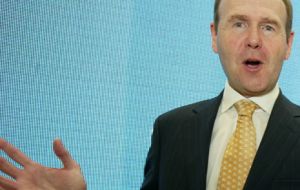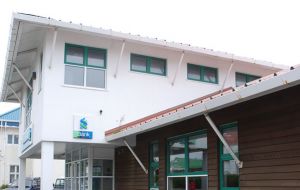MercoPress. South Atlantic News Agency
Standard Chartered record profits; criticizes regulation proposals
 Chairman John Peace bets on China and India
Chairman John Peace bets on China and India Standard Chartered has reported record profits in 2009 and criticised some recent proposals to regulate banks. Pre-tax profits were 5.15 billion USD (£3.4bn), up 13% from 2008. Total pay and bonuses rose 4% to 4.91 billion USD.
The bank - which is based in the UK but makes most of its profits in Asia - said it was in the “interests of the business” to pay out bonuses. The bank also has a branch in the Falkland Islands.
“2009 was the seventh successive year of record income and profits,” Standard Chartered chairman John Peace said.
The bank said it had “concluded that it is in the interests of the business and our shareholders to reward the management team for yet another successful year and to retain top talent in these fiercely competitive markets”.
HSBC boss Michael Geoghegan is donating his bonus to charity, while the heads of Barclays and the bailed-out Royal Bank of Scotland and Lloyds Banking Group have all waived their bonuses.
The issue of compensation has been on the agenda since the financial crisis, with bonuses to bankers at institutions that took taxpayer's money provoking much public anger.
Standard Chartered said it had spread the cost of the UK government's 50% bonus tax across all its employees - reflecting the fact that UK staff number 2,000 out of its total of 77,000 employees.
But it said total pay and bonuses as a proportion of revenue dropped to 32% in 2009. It was 4.74 billion USD in 2008, or 34% of revenue. The bank's profits were fuelled by strong performances in fast-growing economies such as China and India.
India generated more than 1 billion in profits for the bank in 2009, its second market to do so after its Asian base of Hong Kong. In 2009, income from its top 50 clients increased by 38% and total revenue for the year increased 9% to 15.18 billion USD.
The company also confirmed that it is planning a stock listing in Mumbai in the first half of this year.
Standard Chartered - which did not directly accept taxpayer support during the crisis - also came out strongly against proposed regulation of the banking sector to prevent future financial crises.
US President Barack Obama has proposed curbing the activities of the biggest US banks, meaning that some banks may have to be broken up and cannot use their own money in investments - known as proprietary trading.
The principles are similar to that that underlined the Glass-Steagall Act, a law passed in the 1930s in the aftermath of the Great Depression that separated commercial and investment banking and was eventually abolished in 1999.
Standard Chartered chief executive Peter Sands called the proposals “bad ideas”.
“Variants of Glass-Steagal seem to us hugely distracting, costly and unlikely to make anyone or anything safer,” he said.
“This is not to say we are against all the proposals or are defending the status quo,” Mr Sands said. “Better regulation is clearly needed.”





Top Comments
Disclaimer & comment rulesCommenting for this story is now closed.
If you have a Facebook account, become a fan and comment on our Facebook Page!